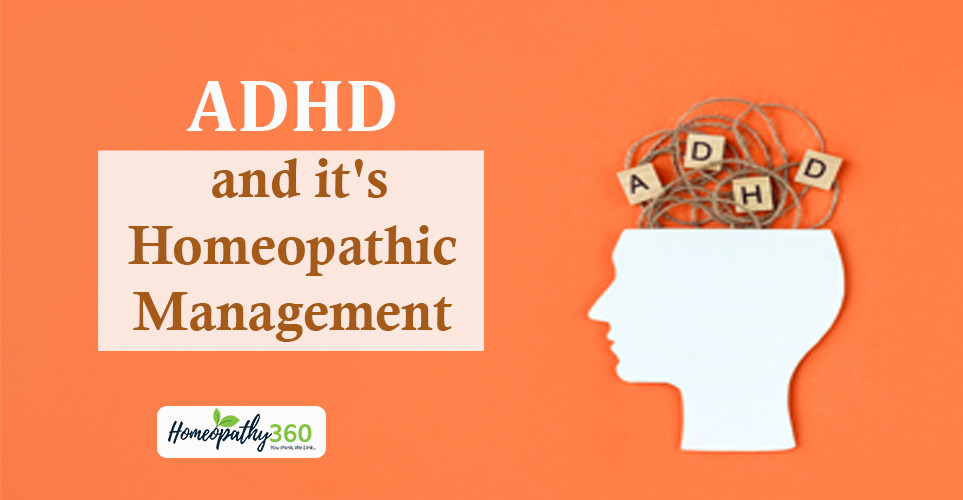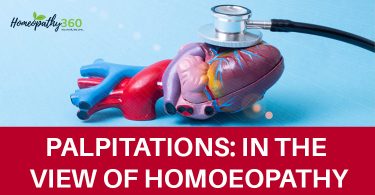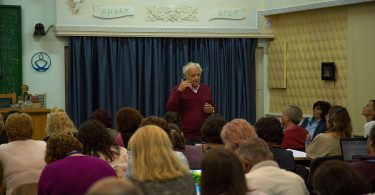
Attention deficit/hyperactivity disorder (ADHD) is among the most common neurobehavioral disorders presenting for treatment in children and adolescents. ADHD is often chronic with prominent symptoms and impairment spanning into adulthood. ADHD is often associated with co-occurring disorders including disruptive mood, anxiety, and substance abuse. The diagnosis of ADHD is clinically established by review of symptoms and impairment. The biological underpinning of the disorder is supported by genetic, neuroimaging, neurochemistry and neuropsychological data. Consideration of all aspects of an individual’s life needs to be considered in the diagnosis and treatment of ADHD.
Multimodal treatment includes educational, family, and individual support. Psychotherapy alone and in combination with medication is helpful for ADHD and comorbid problems. And Homeopathic management.
KEYWORDS: ADHD, ADD, comorbidity, Homeopathic management.
ABBREVIATIONS: ADHD ( attention deficit hyperactivity disorder) , ADD ( attention deficit disorder).
INTRODUCTION
ADHD shows a pattern of developmentally inappropriate levels of inattentiveness. Hyperactivity or impulsivity.
It include dysfunction of executive functioning. Predominantly Frontal lobe activity therefore patients with ADHD show disability Not only in attention and focus but also in decision making and Emotional regulation, Children with ADHD can have difficulty with social interaction can easily be frustrated and impulsive.
The symptoms begin at a young age and usually include lack of attention, lack of concentration disorganization, difficulty completing tasks, being forgetful and losing things. These symptoms should be present before the age of 12 and last six months and interfere with daily life activities.
EPIDEMIOLOGY; INATTENTIVE is Prevalence in about 18.3% of total patient while hyperactive/impulsive and combined represent 7.06%
Need for this study is to analyze homeopathic management With the help of animal groups in the case of ADHD. Homeopathy believes in Holistic approach where the patient is considered as whole. It takes into account the unique, distinctive nature and characteristics of each child, no less and prescribes treatment accordingly. Homeopathy also lays greatest emphasis in treating ‘sources of emotional problems that often appear at the deepest, most protective level. In this process it restores the child’s emotional potential to its optimal level. Homeopathy treats children with ADHD as individuals based on their unique characteristics, temperament and presenting or latent symptoms, Homeopathy improves child’s behavior and learning ability. Our approach is by administering homoeopathic medicine which boosts up nutritional absorption cell production and maintains stable Harmony of individuals.
Six (or more) of the following symptoms have persisted for at least 6 months to a degree that is not consistent with developmental level and that negatively impacts on social and Level of academics. A persistent pattern of inattention and Hyperactivity that Interferes with development and functioning that include as
1.Inattention occupational activities.
A. difficulty in attention to details or makes careless mistakes in schoolwork, at work, or during other activities (e.g., overlooks or misses details, work).
B difficulty in sustaining attention in tasks or play activities (e.g.. has difficulty remaining focused during lectures, conversations or lengthy reading).
C. does not seem to listen when spoken to directly (e.g., mind seems Else. Where, even in the absence of any obvious distractions).
D .does not follow through on instructions and fails to finish Schoolwork, chores, or duties in the workplace.
E. Difficulty organizing tasks and activities.
F- dislikes, or is reluctant to engage in tasks that require sustained Mental effort.
G. loses things necessary for tasks or activities
2. Hyperactivity and impulsivity symptoms have persisted for at least 6 months and inconsistent with developmental level and that negatively impacts directly on social and academic/occupational activities:
Interrupts or intrudes on others (e.g may start using other people’s things without asking or receiving..
Inattentive or hyperactive-impulsive symptoms are present In two or more settings (eg, at home school, or work, with Friends or relatives; in other activities). Symptoms interfere with, or reduce the quality of, social, academic, or occupational functioning.
ASSOCIATED FEATURES SUPPORTING DIAGNOSIS
Mild delays in language, motor, or social development are not specific to ADHD but often co occur. Associated features Which include low frustration tolerance, irritability, or mood lability. Even in absence of a specific learning disorder, academic or work performance is often impaired. Inattentive behavior is associated with cognitive processes, and individuals with ADHD may exhibit cognitive problems on tests of attention, executive function, or memory, early adulthood, ADHD is associated with an increased risk of suicide attempt, primarily when comorbid with mood, conduct, or substance use disorders.
RISK AND DIAGNOSTIC FEATURES
• Temperament-ADHD is associated with reduced behavioral inhibition, negative emotionality; and elevated novelty seeking.
- Environmental – low birth weight (less than 1.5 kg/hisk for ADHD, but most children with low birth weight do not develop ADHD. A minority of cases may be related to reactions to aspects of diet. There may be a history of child abuse, neglect, multiple foster placements, neurotoxin exposure (eg, lead), infections (e.g., encephalitis).
- Genetic and physiological: ADHD is substantial. While specific genes have been correlated with ADHD, they are neither necessary nor sufficient causal factors. Visual or hearing impairments, metabolic abnormalities, sleep disorders. Nutritional deficiencies, and epilepsy should be considered as possible influences on ADHD symptoms
PREVENTION
- In pregnancy, avoid anything that could harm fetal development For example, avoid having alcohol, use recreational drugs or smoke cigarettes. Protect children from exposure to pollutants and toxins Including cigarette smoke and lead paint.
- Decrease screen time it prudent for children to avoid excessive exposure to TV and video games in 1-5 yr of life.
TREATMENT
- ADHD behavior therapy
Children with ADHD benefit from behavior therapy, social skills training, parent skills training and counseling, which need to be provided by a psychiatrist, psychologist, social worker or other mental health professional.
Example of therapy includes:
1.Behavior therapy: such as taking reward systems and timeouts, for Dealing with difficult situations.
2.Social skills training, which helps children to learn appropriate social behaviors.
3.parents skills training. This helps parents develop ways to Understand and guide their child’s behavior.
4.Psychotherapy. This is for older children with ADHD to talk about issues that bother them, explore negative behavior patterns and learn ways to deal with their symptoms. Of living.
5.Family therapy, which help parents and siblings deal with the stress
- Alternative mode of treatment
Yoga or meditation, regular yoga routines or meditation and relaxation techniques helps children to relax and learn discipline, which may help them manage their symptoms of ADHD.
1.Special diets. Most diets promote ADHD involvement. foods thought to increase hyperactivity such as sugar, and common allergens, such as wheat, milk and eggs. Some diets recommend avoiding artificial food colorings and additives. So far, studies haven’t found a consistent link between diet and improved symptoms of ADHD, though some incident evidence suggests diet changes might make a difference in children with specific food sensitivities Caffeine use as a stimulant for children with ADHD can have risky effects and is not recommended.
- Vitamin and mineral supplements.
HOMEOPATHIC APPROACH
Homeopathic medicine is very effective in case of ADHD.
Aim Of the homeopathic medicine in pediatrics is to stimulate a child’s own curative power to cure them. In a way homoeopathy helps a child’s body to heal themselves. From the day of birth the infant undergoes a lot of changes and a rapid physical and mental growth takes place. A child has to be assessed according to its age, family background as well as social and cultural background. So that the individuality and totality of the child is understood properly. One person’s normality may be another person’s pathology and vice versa. More specific the treatment, the more effective the treatment will be.
Tarentula Hispanica symptoms of high level of hyperactivity, ODD, Constantly on move, Fidgety, restless. It is used when a child is hyperactive with marked restlessness and impatience
Hyoscyamus Nig symptoms of high level of hyperactivity, Impulsivity, Violence and Sexual Symptoms. It is Suitable in cases when there is impulsiveness with the desire to strike and bite in high degrees.
Stramonium to reduce aggressive or violent behavior, a common occurrence in children with ADHD or comorbid oppositional defiant disorder. children with post-traumatic stress disorder, or other forms of anxiety, Symptoms of high level of hyperactivity, bites, spits, kicks and full of fears.
Tuberculinum Bovinum is indicated when a child displays hyperactivity along with an impulse to run away.Use of the medicine Tuberculinum Bovinum is suggested when there are fits of angry outbursts coupled with screaming, and a tendency to use abusive language. These may be further combined with destructive behavior and throwing things at others. Chamomilla and Tuberculinum Bovinum are the homeopathic medicines that are used to treat anger outbursts in children with ADHD.
Chamomila Symptoms of anger coupled with irritable and cross behavior indicate the need for the medicine Chamomilla. The child may also be spiteful and snappish.
Veratrum album ADHD and comorbid anxiety. It is used to reduce the potential for temper tantrums in children who struggle to control their emotions.
Cina For milder cases of adhd, Child cross,difficult to please and symptoms of teeth grinding
Baryta Carb works in treating concentration difficulties in children having ADHD. Children who need Baryta Carb cannot concentrate or pay attention to any work. Difficulty in concentrating during studies is also pronounced in such cases. The affected children cannot fix their attention while reading, thereby forgetting the lesson.
Lycopodium Clavatum is used in cases where children show difficulty in concentration during reading and conversation. They also tend to be confused and display traits of low self confidence.
REFERENCE
- Diagnostic and statistical manual of mental disorder DSM-5. Page no.59-66
- American Psychiatric Association. Diagnostic and Statistical Manual of Mental Disorders, 4” ed. (DSM-IV). Washington DC, American Psychiatric Association, 1993 pgno. 63-65
- Klegiman Robert M, beherman Richard E, jensonhal B, Stanton Bonitaf; Nelson textbook of paediatrics vol.1; 18th edition
- . Homeopathic materia medica group study by Dr.Arvind Jain, page no.23-31
- Allen’s keynote
- GHAI essential pediatrics, 9 th edition by Dr.vinod paul and Arvind 6. Organon of medicine 6th edition by Dr.samuel Hahnemann.aph.153 and 210-230.
- Dixit,principle and boi statics,bhanot publisher,5the edition 2011 page 115- 120.
- Bhatia MS, Choudry S, Sidana A. Attention deficit hyperactivity disorder Among psychiatric out patients. Indian pediatr 1999; 36:5837
- “Homoeopathy ForBehavioral Problem in Children”. The Homoeopathic Heritage 33.9070 6038 (2008): 46 by DR.anuradha ans v.chauhan.
- D, Gursale A, Jadhav P. Prevalence of parent-rated attention deficit Hyperactivity disorder and associated parent rated factors in primary school children of Navi Mumbai-a school based study. Indian J Pediatr 2013;80:207By dr.ajinkya.
- Chaturvedi SK. Patterns of childhood psychiatricDisorders in India, Indian J Pediatr 1984; 51: 235-239.
- .Bhatia MS, Nigam VR, Bohra N, Malik Sc. Attention deficit disorder with Hyperactivity among pediatric outpatients. J Child Psychol Psychiatry 1991, 32 297-306.
- Barkley RA, Fischer M, Edelbrock CS, Smallish L. The adolescent outcome of Hyperactive children diagnosed by research criteria: 1. An 8 year prospective Follow-up study. J Am Acad Adol Psychiatry 1990;29:546-557.




